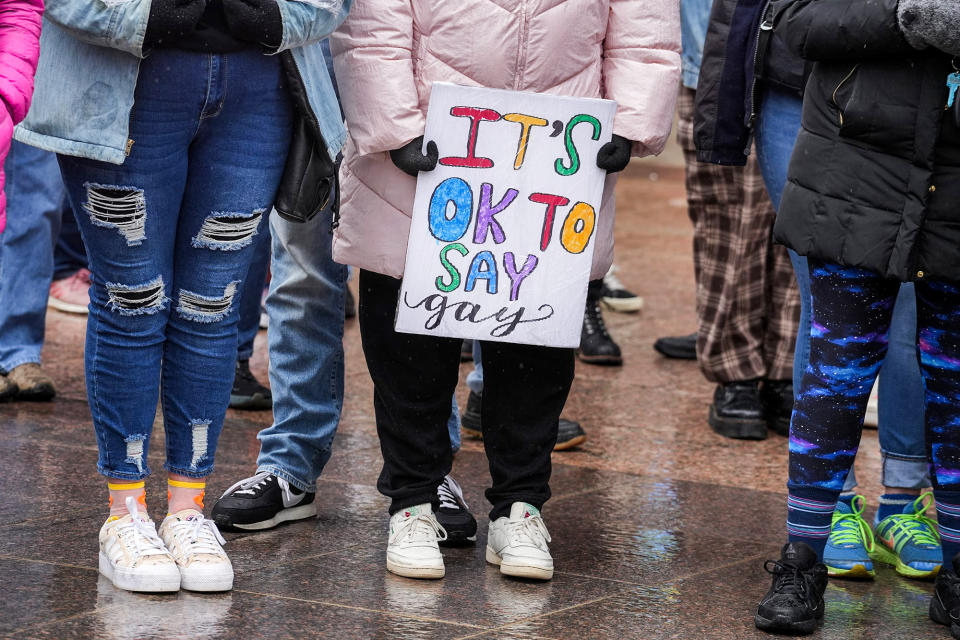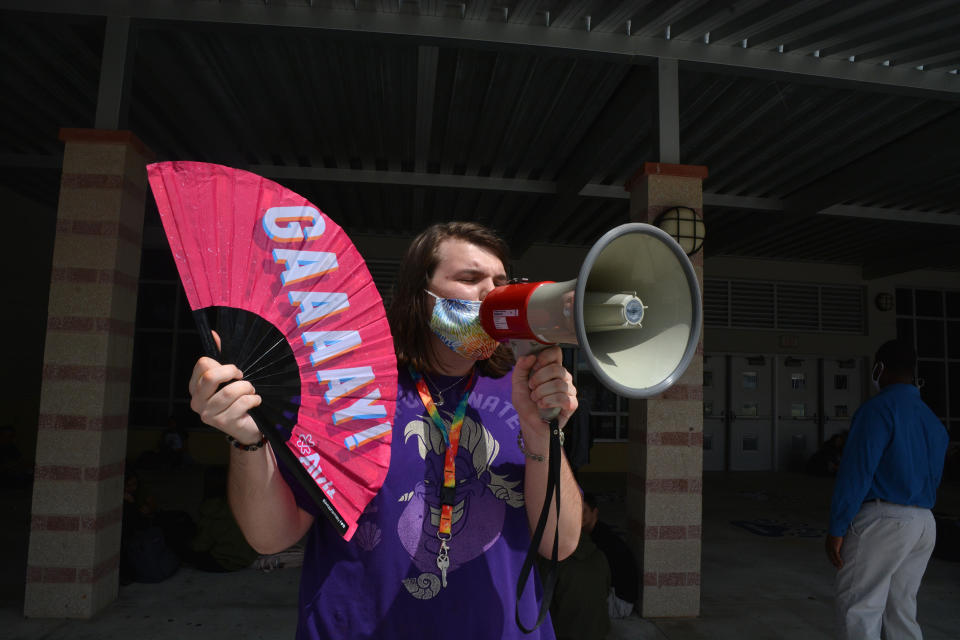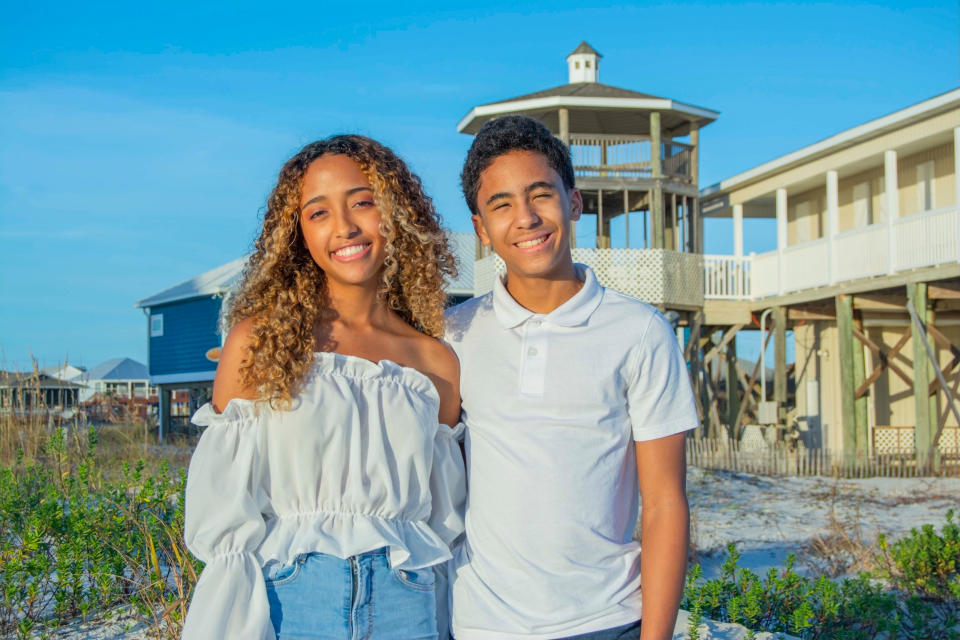As GOP states restrict classroom talks of racism, student outrage grows: ‘We’re not going to be silenced’
George Izu, a 14-year-old student in Katy, Texas, no longer feels like school is a place he can trust to fully teach him about history and current events. Since the passage of a Texas law restricting how educators can discuss race and racism, Izu, who is Black, has been frustrated and confused.
He didn't understand, for instance, how one teacher could shy away from conversations about the Holocaust.
“The effects were gruesome and horrible, but it’s still important to learn about what happened, because history is a loop,” he said. “If we don’t learn what happened and how things like this happen, how are we supposed to prevent such things from happening in the future again?”
Izu said he now has to supplement his education with other sources he finds credible and trustworthy.
“I shouldn’t have to do that. I should be able to trust what my education is giving me,” he said. "I should be taught history, basically.”
As Republican lawmakers and school boards have proposed or passed education policies to restrict how topics like race and LGBTQ issues can be addressed in schools — removing access to certain books and banning transgender students from sports teams that align with their gender identities — minority and LGBTQ students say they feel they are living through a time when their values, and even their identities, are under attack.
In recent interviews, middle school and high school students living in states that have recently passed laws restricting what they can learn said the direction of education in America has left them fearful, anxious and frustrated but also determined to fight back.

Darion Frazier, a 17-year-old junior in DeKalb County, Georgia, said he has been “upset and appalled” by how Republican legislators have focused on “these things that are just not real problems” when “we and students across Georgia have real problems that deserve to be addressed immediately.”
Last month, Georgia Gov. Brian Kemp signed several controversial education bills into law that, among other things, restrict discussions about race in classrooms and allow for transgender athletes to be excluded from sports teams that align with their gender identities, reflecting a national push by Republicans to redefine American schools.
Republican legislatures and activists across the country have targeted curriculums and called for the removal of books dealing with racism or sexuality, the majority of them featuring LGBTQ characters and issues. Supporters of some of the bills say that they are protecting “parent rights” and that the bills give parents more say in their children’s education.
Frazier, who is Black, said he has been attending classes in a building with mildew, sewage system problems and HVAC system issues.
“We should be worried about sewage problems in our schools, HVAC systems’ not working properly, teachers’ continuously being underfunded,” he said, and not arguments about “critical race theory” or banning transgender students from some sports teams.
Christin White-Kaiser, whose 12-year-old son, Mylo, is transgender, said she has seen her child become “very withdrawn” from having talked to anyone outside his family. He has been home-schooled for part of this year because of bullying and the discussions around a proposed Louisiana law that would restrict how educators can address sexual and gender identities, which opponents call a “Don’t Say Gay” bill. A similar measure has been signed into law by Florida Gov. Ron DeSantis.
White-Kaiser said Mylo told her such bills make him feel that people who identify as LGBTQ “don’t matter” and that legislators “want to get rid of us by making us shut up.” Mylo has written letters and emails to state representatives.
“I wish people would ask more questions and want to understand that we’re not the enemy,” White-Kaiser said Mylo told her. “We just want to be our true self.”
Florida high school senior Zander Moricz, who is part of a lawsuit over the state’s so-called Don’t Say Gay law, said he has gotten numerous messages from fellow LGBTQ students who are “really, really worried” about what it means for their lives.

Students asked questions: Should they still wear LGBTQ Pride pins on their backpacks? Some were planning to come out and were now questioning whether they still should.
“That was the most heartbreaking thing in the world,” said Moricz, 18, who is gay.
Moricz said it was “horrifying” to watch how the bill passed and was embraced by conservatives.
“For something like silencing an entire community to feel socially acceptable, that’s a nightmare. That’s dystopian,” he said.
Florida passed the Parental Rights in Education bill this year. The bill prohibits “classroom discussion about sexual orientation or gender identity” in the state’s primary schools.
CJ Walden, 17, a high school senior in Florida who is vice president of PRISM, an advocacy group for LGBTQ youths, said students of all ages fear what the law means for their futures.

“I’ve seen throughout every single person that I’ve talked to heightened levels of fear and exasperation,” he said.
LGBTQ students face homophobia and bullying, sometimes from family members who don’t support their identities.
“They don’t have support at home, and this bill threatens to take away that support at the only other place they could turn to: school,” he said. “What do we expect to happen?”
Walden said that while he and other youths are worried about what comes next, the LGBTQ community “is not going to just step down.”
“We’re not going to be silenced,” he said. “We are going to be loud.”

Students across Florida have staged protests, marches and walkouts in response to the legislation.
“We’re not going to back down, not women, not the LGBTQ+ community and certainly not people of color, either,” he said.
In Katy, Texas, George Izu’s sister, Gabrielle Izu, a high school senior, said that when she sees the restrictions on education or the types of books that are being removed from schools, “it’s terrifying, because that’s my history.”
“When you don’t allow people to learn and when you hide things from them, you can essentially change reality,” she said.
Gabrielle Izu, 17, said she has spoken at Katy Independent School District board meetings and seen how some parents who supported the conservative education policies directly opposed students’ speaking out.
“Seeing people take something as sacred as education, as integral to somebody’s development, somebody’s understanding of the world, and try to bend it to their own will has been terrifying,” she said.
George Izu said he is proud of his sister’s advocacy and efforts to stand up for what she believes in.
“It’s nice to know that at least some groups are taking action to try and do their best to get our education to, honestly, where it should be,” he said, adding that he wishes his sister and other students did not have to do that.
“I’m proud of her and disappointed in the system,” he said.

